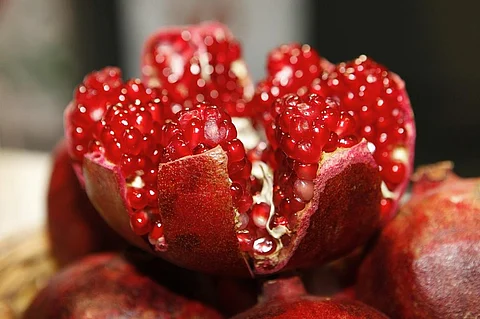

CHENNAI: Deep coloured rind, a notso-round shape, heavy and full; roll it, tear it open, and free the shiny rubies into a bowl, scoop a spoonful of the juicy jewels and pop it into your mouth to enjoy bursts of sweetness and tartness.
Pomegranate seeds, besides packing a delicious punch, also brim with antioxidants and polyphenols that help in reducing inflammations, fighting infections, boosting brain functions and reducing the risk of heart diseases, among other health benefits. Dhanalakshmi R, dietician, Rainbow Children’s Hospital, shares how adding the edible insides of the fruit to the plate daily, can be a diet change you won’t regret.
Nutrients
Pomegranate seeds are a great source of fibre, vitamins C, K and minerals such as calcium, potassium and iron. Two compounds — punicalagin and punicic acid — are responsible for almost 95 per cent of its health benefits. They also have antioxidant activity higher than that of green tea. Beneath the pockets of juice in the white seeds are where one can usually find a majority of fibre. The seeds contain a good volume of vitamin C.
Low calorie
Carrying approximately 230 calories, adding pomegranate seeds in your day-to-day meal — salad, juice or as a quick snack — will help you not only enjoy a delicious meal but also keep a check on your weight. It is recommended to eat the seeds fresh and raw or simply as a quick garnish. You can add the seeds to salads, raita, oatmeal and yogurt or can be topped on a simple curd rice dish too!
Antioxidants
Pomegranate seeds contain a high number of antioxidants and help in protecting the body against inflammation and free radical damage. These antioxidants, often known as polyphenols, include tannins, flavonoids, and anthocyanin.
Recommended consumption
Consuming one cup of pomegranate seeds every day — approximately 173 g a day — helps in reducing the risk of heart diseases, arthritis and joint pain, fighting cancer, lowering blood pressure levels, improving memory and fighting bacterial infections and acting as a barrier against dental diseases like gingivitis. However, with high antioxidant and potassium content present in the seeds, regular consumption could be problematic to people with kidney-related ailments.
So, those with such comorbidities can reduce the consumption to once a week. Eating pomegranate seeds as part of a balanced and healthy diet is considered safe for most healthy adults. However, if you identify allergy reactions, discontinue consumption and consult a medical professional. The good quantity of folic acid and antioxidants in the seeds help in improving fertility in both men and women by increasing sperm health, concentration and motility in men and improving the overall reproductive health in women.